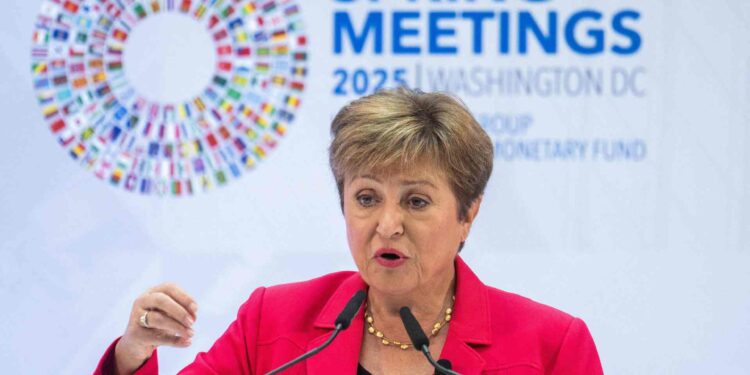The International Monetary Fund expected the Middle East and North Africa economies to grow, which includes Arab countries by 2.7% in 2025, a decline from 3.6%, expected in January, amid pressure from the trade war launched by US President Donald Trump.
In its report on the growth of the global economy, the Fund reviewed its expectation of the growth of the global economy by lowering to 2.8% during the current year from 3.3%, which was expected last January, and the fund also reduced growth expectations next year to 3% from 3.3% expected.
In the Fund’s report, he pointed out that his expectations for the growth of the economies of Qatar and Morocco, Egypt exceeded its previous expectations, and that the economies of both Iraq and Sudan Senkshan.
Expectations of the growth of Arab economies
- The IMF expected the growth of Saudi economy 3% in 2025 a decrease from 3.3%, which was expected last January, and to 3.7% in 2026 from 4.1%.
- The Fund suggested that the UAE economy grow 4% in 2025 a decrease from 5.1%, which was expected in September last September.
- The Fund expected Algeria’s economy to grow by 3.5% in 2025 out of 3%, which was expected last September.
- The Fund expected to shrink the economy of Iraq 1.5% instead of expecting 4.1% growth last September.
- The fund raised its expectation for the growth of Qatar’s economy to 2.4% in the current year from 1.9%, which was expected last September.
- The fund reduced its expectation of the growth of Kuwait’s economy to 1.9% from 3.3%, which was expected last September.
- The Fund expects the growth of the Economy of the Sultanate of Oman by 2.3% in 2025 a decrease from 3.1%, which was expected last September.
- The fund raised its expectation of Egypt’s economy to 3.8% in 2025 from 3.6%, which was expected in January and to 4.3% in 2026 from 4.1%.
- The fund raised its expectation for the growth of Morocco’s economy to 3.9% in 2025 from 3.6%, which was expected last September.
- The fund reduced its expectation of Jordan’s economy to 2.6% in 2025 from 2.9% expected in September.
- The Fund expected Sudan’s economy to shrink by 0.4% compared to 8.3% expectations last September, but the fund expected 8.8% growth next year.
Difficulty
The fund warned of the difficulties on the horizon for the Middle East and Central Asia, including a slower gradual increase than expected in oil production.
Oil -based governments are under pressure due to the decline in crude oil prices to their lowest levels since the Korona pandemic, and officials are preparing to meet the decrease in revenues with policies, including issuing more debts and reducing spending.
Economists say that the oil -exporting Gulf states are still seen as relatively isolated from the fluctuations of the oil market thanks to the high reserves, low debt and ongoing diversification efforts.



